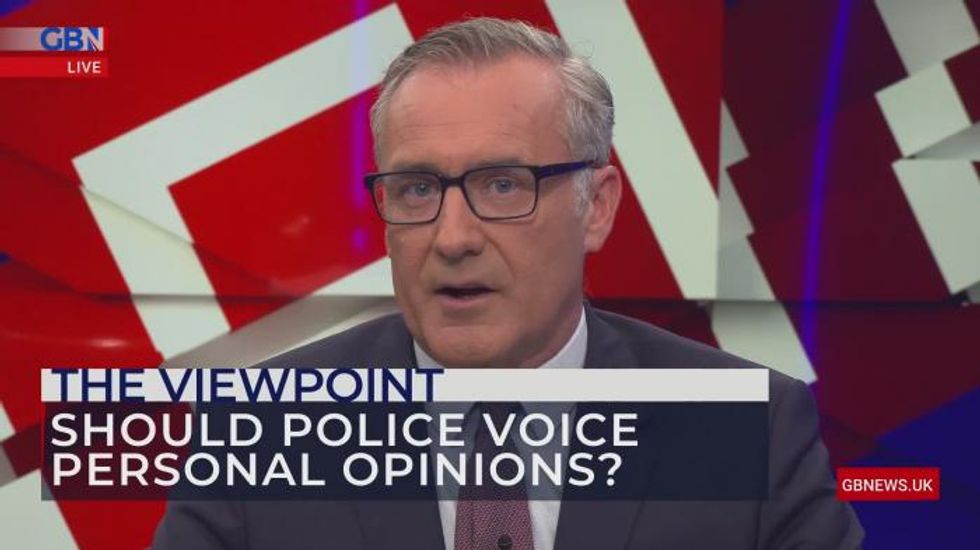Do we want our taxpayer-funded police officers to be mute enforcers of the law, or give them the freedom to reveal their personalities?
Don't Miss
Most Read
Trending on GB News
It’s not easy being a copper.
Take the weekend’s football. For many England fans, it was a chance to party. For police officers it was a looming public order problem.
Sure enough, once the drink kicked in, the police had to step in too – and make 86 arrests. And that was just in London.
England fans clash with police in Piccadilly Circus, London, after Italy beat England on penalties to win the UEFA Euro 2020 Final
Victoria Jones
After a day dealing with the sorts of horrors and scumbags that only police officers get to see, you can imagine why some of them want to get it off their chest.
In recent years there’s been a sharp growth in the number of officers who talk about their experience of front-line policing online, mainly on Facebook and Twitter.
But senior officers say things are getting out of hand. They’re worried that the strict rules that govern the reporting of crimes – and guarantee fair trials - are potentially being undermined. Not by pesky journalists – we have traditionally been a worry - but by bobbies on the beat with a digital profile.
The North Yorkshire force, for instance, has told its 1,357 officers that they must stop using personal accounts to tweet about their police work. If there’s news to the be shared with the public – it must come through official channels.
This hasn’t gone down well.
Marc Jones, the incoming chairman of the Association of Police and Crime Commissioners, said this week that these accounts give policing a human face, never more needed than after lockdown when – it’s fair to say – the idea of policing by consent was sometimes stretched to breaking point. Just using what he describes as “sterile corporate accounts” is, he says, a mistake.
For me, this row poses another question. Do we want our taxpayer-funded police officers to be mute enforcers of the law, or give them the freedom to reveal their personalities?
Let’s turn the clock back to 2008 and a different Yorkshire police force. The setting was the steps outside Leeds Crown Court and the trial of a criminal who had scandalised her community. This was the case of Karen Matthews.
Karen Matthews, mother of Shannon Matthews, was described as 'pure evil'
Dave Thompson
She had just been convicted of kidnapping her own child. Matthews had seen the public’s reaction to the disappearance of Madeleine McCann and decided, along with her odious boyfriend, that it was a way of making money. While the public and police searched frantically for her daughter Shannon, she had – in fact – been hidden in the loft of a nearby house.
The investigation cost West Yorkshire police £3.2 million. And it was obvious there was a lot of public interest as the verdict was delivered. I was on-air at Sky News when a Detective Superintendent gave a statement to the waiting cameras. He described Matthews as “pure evil”.
Well, she was unquestionably a pretty vile character, but “pure evil”.
At the end of the day this wasn’t the Yorkshire Ripper we were talking about, but a pathetic, amoral, weak-willed, not terribly clever, mother of five. “Pure evil.” Hyperbole. And a sentencing judge later suggested as much.
But as I sat in the studio that day, I wasn't alone in thinking that something was changing. A world in which police officers took the heat and emotion out of a crime appeared to have been replaced by one in which they injected subjectivity, opinion and feelings.
It wasn’t just that particular officer who, to be fair, had just brought a trying and difficult case to a successful prosecution. It was countless others to. Police officers outside courts or crime scenes, addressing the cameras with phrases like: “….in the course of my 30 years of policing this is the worst crime I have ever seen.
Were officers seizing their moment in the spotlight? Was this a case of life imitating art? If cop dramas show dramatic scenes of detectives emoting at press conferences, maybe real cops think that’s the done thing.
I don’t know, none of us do. Only those we charge with the heavy responsibility of bringing to justice the most obnoxious and dangerous people we share the streets with can know what it’s like to bring someone like that to book. But I think there’s something to be said for saying nothing, whether that’s in front of the cameras or online. We live in a world where feelings sometimes trump evidence, and where justice is better served by focusing on the latter.
I, for one, like our coppers to be boring.











